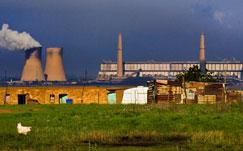South Africa sets aside billions to revitalise mining towns
17 March 2015
The Gauteng government will spend R240-million to develop economically
depressed former mining towns in the province, according to the provincial minister
of human settlements, co-operative governance and traditional affairs, Jacob
Mamabolo.
He was speaking at Grootvlei Mine in Springs on 16 March, after he handed over
toilets and a farming project to the community. It also received extra taps, with the
help of the city of Ekurhuleni.
"We have brought in a sponsor in the form of Red Ants Eviction and Security
Services, [which is] going to start a garden with the community," Mamabolo said.
"They told us that the land can produce 45 000 cabbages. The community will be
able to eat and sell some of them for income."
His department would help the community to register a co-operative with the
provincial department of economic development so they could sell vegetables to
retailers.
Community leader Jeremia Aphane
said residents were very happy with the
services the government had brought to the area. "The garden project is more
exciting as it has potential to create more jobs. We are going to set up a committee
so that we make sure every household has someone who works in it," he said.
The Gauteng intervention in mining towns is part of a broader effort that is being
overseen by the Portfolio Committee on Human Settlements.
A budget of more than R9-billion had been set aside for the revitalisation of mining
towns and the eradication of informal settlements, it was revealed when the
portfolio committee met the inter-ministerial committee (IMC) responsible for the
development of mining towns and eradication of informal settlements, on 10 March.
The government contributed R6-billion of the overall funding, while mining
companies had contributed more than R3-billion, the committee said.
The IMC is leading the implementation of the Special Presidential
Package for
Distressed Mining Towns, set up by President Jacob Zuma to revitalise mining
communities and eradicate informal settlements. The IMC comprises
representatives from the departments of Human Settlements, Mineral Resources
and Labour, as well as The Presidency.
The package includes 15 towns in Limpopo, Gauteng, North West, Mpumalanga and
Free State, as well as 12 labour-sending areas in Eastern Cape and KwaZulu-Natal.
There are 136 informal settlements in the municipalities, and 119 National
Upgrading Support Programme (NUSP) priority informal settlements.
According to the provinces' business plans, there are 87 projects, of which 52 are
under way, with 24 029 planned units and 8 197 completed units.
The portfolio committee called for guidelines to be drawn up setting out the criteria
for how much funding mining companies should contribute to the package, as well
as other relevant projects.
SAinfo reporter
 A shack settlement on the outskirts of a coal mine in Mpumalanga. (Image: Wikimedia Commons: Hein Waschefort)
A shack settlement on the outskirts of a coal mine in Mpumalanga. (Image: Wikimedia Commons: Hein Waschefort)




